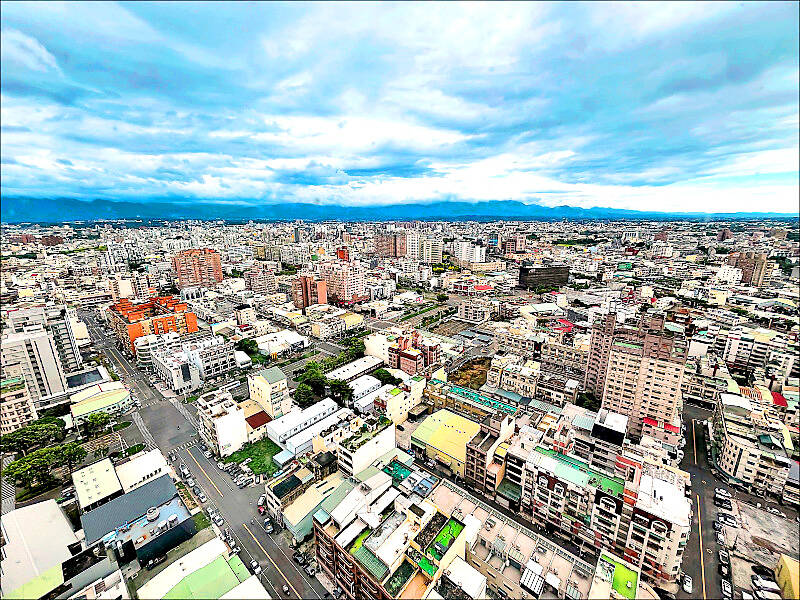The large number of old buildings in Taipei is making it more challenging to address the city’s rapidly aging population, a housing researcher said.
As of June, 11 of Taipei’s 12 districts were “super-aged,” meaning that at least 20 percent of their populations were aged 65 or older, housing researcher Ho Shih-chang (何世昌) said on Saturday, citing Ministry of the Interior data.
Seventy-three percent of the city’s buildings are at least 30 years old, he added.

Photo: Taipei Times
“For every 1.37 homes in the city there is one home that was built before the 921 Earthquake in 1999,” he said.
Of the 368 administrative regions and districts nationwide, 191 — 51.9 percent of the total — are super-aged, he said.
While the aging population is a nationwide problem, the situation is particularly pronounced in Taipei, where 90 percent of districts are super-aged and half of the homes are more than 40 years old, he said.
As many as 18 percent of the city’s homes are 50 years old or older, and that number is growing, as urban renewal efforts fail to keep pace, Ho said.
“With housing prices so high, some buyers favor older buildings, which offer more space at lower prices,” he said. “Their mindset is that even though the buildings are 40 or 50 years old, they can live there and wait for the building to be replaced under an urban renewal project.”
Ministry data showed that of the 4,435 property sales and transfers in Taipei in the second quarter of this year, 2,829 were in buildings that were older than 30 years old, accounting for 63.79 percent of the total.
Of those 2,829 properties, 2,211 were more than 40 years old, accounting for nearly 78 percent of the aging properties sold, Ho said.
“One out of every 1.56 residential transfers in Taipei is an old property. Only 91 properties sold in the past five years were new, accounting for about 2.05 percent of the total,” he said. “That means that only one out of every 48.78 property transfers in Taipei is a new property.”
A building built before 1999 — when new construction standards were introduced to improve their earthquake resilience — is not necessarily dangerous to live in, Sinyi Realty Inc (信義房屋) research manager Tseng Ching-der (曾敬德) said.
“However, buildings constructed after that date follow stricter standards,” he said.
Andy Huang (黃舒衛), director of Landlord Representation Services at Colliers International Taiwan, said the situation is in a downward spiral, with older buildings decreasing in value as the financial capacity of elderly people declines as they get older, he said.
“Outside assistance is needed to balance the quality of life and financial situation of older people, especially amid this housing market,” he said. “Otherwise, social risks would worsen.”
To address the housing crisis faced by older people, Huang recommended integrating policies and resources, while accelerating the institutional reform of the rental market and social housing.

SECURITY: As China is ‘reshaping’ Hong Kong’s population, Taiwan must raise the eligibility threshold for applications from Hong Kongers, Chiu Chui-cheng said When Hong Kong and Macau citizens apply for residency in Taiwan, it would be under a new category that includes a “national security observation period,” Mainland Affairs Council (MAC) Minister Chiu Chui-cheng (邱垂正) said yesterday. President William Lai (賴清德) on March 13 announced 17 strategies to counter China’s aggression toward Taiwan, including incorporating national security considerations into the review process for residency applications from Hong Kong and Macau citizens. The situation in Hong Kong is constantly changing, Chiu said to media yesterday on the sidelines of the Taipei Technology Run hosted by the Taipei Neihu Technology Park Development Association. With

A US Marine Corps regiment equipped with Naval Strike Missiles (NSM) is set to participate in the upcoming Balikatan 25 exercise in the Luzon Strait, marking the system’s first-ever deployment in the Philippines. US and Philippine officials have separately confirmed that the Navy Marine Expeditionary Ship Interdiction System (NMESIS) — the mobile launch platform for the Naval Strike Missile — would take part in the joint exercise. The missiles are being deployed to “a strategic first island chain chokepoint” in the waters between Taiwan proper and the Philippines, US-based Naval News reported. “The Luzon Strait and Bashi Channel represent a critical access

‘FORM OF PROTEST’: The German Institute Taipei said it was ‘shocked’ to see Nazi symbolism used in connection with political aims as it condemned the incident Sung Chien-liang (宋建樑), who led efforts to recall Democratic Progressive Party (DPP) Legislator Lee Kun-cheng (李坤城), was released on bail of NT$80,000 yesterday amid an outcry over a Nazi armband he wore to questioning the night before. Sung arrived at the New Taipei City District Prosecutors’ Office for questioning in a recall petition forgery case on Tuesday night wearing a red armband bearing a swastika, carrying a copy of Adolf Hitler’s Mein Kampf and giving a Nazi salute. Sung left the building at 1:15am without the armband and apparently covering the book with a coat. This is a serious international scandal and Chinese

COUNTERINTELLIGENCE TRAINING: The ministry said 87.5 percent of the apprehended Chinese agents were reported by service members they tried to lure into becoming spies Taiwanese organized crime, illegal money lenders, temples and civic groups are complicit in Beijing’s infiltration of the armed forces, the Ministry of National Defense (MND) said in a report yesterday. Retired service members who had been turned to Beijing’s cause mainly relied on those channels to infiltrate the Taiwanese military, according to the report to be submitted to lawmakers ahead of tomorrow’s hearing on Chinese espionage in the military. Chinese intelligence typically used blackmail, Internet-based communications, bribery or debts to loan sharks to leverage active service personnel to do its bidding, it said. China’s main goals are to collect intelligence, and develop a